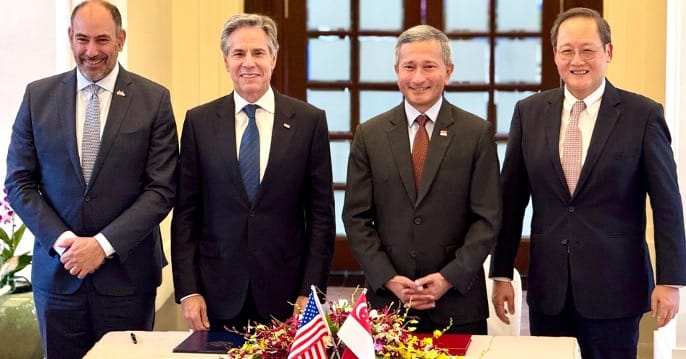Singapore and US Sign Historic Civil Nuclear Cooperation Agreement
Singapore and the US signed a "123 Agreement" to foster peaceful nuclear cooperation, marking a significant diplomatic step forward
In a significant move towards deepening bilateral ties and advancing nuclear energy collaboration, Singapore’s Foreign Affairs Minister Vivian Balakrishnan and US Secretary of State Antony Blinken signed a civil nuclear cooperation agreement today. The agreement, known as a “123 Agreement,” aims to foster peaceful nuclear cooperation between the two nations and is set to last for 30 years once it receives approval from the US Congress.
Today I signed a 123 Agreement on civil nuclear cooperation with Singapore. In addition to deepening our energy partnership with Singapore, they will also join our FIRST program to build capabilities to further explore clean, secure, and safe nuclear energy. pic.twitter.com/0nQgxIcy1r
— Secretary Antony Blinken (@SecBlinken) July 31, 2024
What is a 123 Agreement?
A 123 Agreement is a precondition for substantial nuclear exports from the US, necessitating that the importing country commit to preventing nuclear weapons proliferation. These agreements derive their name from Section 123 of the US Atomic Energy Act, which mandates such non-proliferation measures.
Importance of the Agreement
At the signing ceremony, Minister Balakrishnan emphasized that the agreement would facilitate access to critical information and technological expertise, enabling Singapore to engage more closely with US civil nuclear experts. The agreement also outlines a framework for deepening peaceful nuclear cooperation based on mutual commitment to nuclear non-proliferation.
Benefits for Singapore
According to a joint statement by the US and Singapore governments, the agreement will allow Singapore to participate in capacity-building initiatives like the Foundational Infrastructure for the Responsible Use of Small Modular Reactor Technology (FIRST) programme. This involvement is expected to support Singapore's efforts in understanding and evaluating advanced nuclear energy technologies, which could potentially help meet climate goals while balancing energy needs.
Operation and Scope
The US currently maintains 24 active 123 Agreements with countries including China, India, Indonesia, Vietnam, and the Philippines. These agreements incorporate nine non-proliferation criteria from Section 123, ensuring that partner countries use any gained nuclear information for peaceful purposes. Provisions include physical security of nuclear materials and restrictions on enrichment, reprocessing, and transfer without US consent. Partner countries must also adhere to the International Atomic Energy Agency’s standards on nuclear material use and security.
The US Department of State highlights that these agreements lay the groundwork for collaboration in nuclear energy, educational, and technological exchanges. For Singapore, this agreement facilitates closer collaboration with US institutions and other countries utilizing US-origin nuclear technology, aiding its capability-building journey.
Singapore's Stance on Nuclear Energy
The agreement does not signify a shift in Singapore’s stance on nuclear energy. The Ministry of Sustainability and the Environment (MSE) and the Ministry of Trade and Industry (MTI) clarified that Singapore has yet to decide on deploying nuclear energy. Detailed studies on the safety, reliability, affordability, and environmental sustainability of nuclear energy in Singapore’s context are still required.
Most advanced nuclear reactor designs are still under research and development and have not yet reached commercial operation stages. Singapore remains open to exploring collaborations that support its capability building in nuclear science and safety as part of its broader goal to achieve net-zero emissions by 2050.
Concerns and Opposition
While 123 Agreements are pivotal for nuclear collaboration, they have faced opposition in various countries. Critics argue that India's 123 Agreement with the US defied the spirit of the Treaty on the Non-Proliferation of Nuclear Weapons (NPT) and exacerbated the nuclear arms race with Pakistan. In South Korea, negotiations faced hurdles over uranium enrichment and spent-fuel reprocessing capabilities, which the US opposed due to proliferation risks.
More recently, proposed 123 Agreements with countries like Saudi Arabia have raised concerns over potential nuclear weapons capabilities and regional arms races. The kingdom's desire for a uranium enrichment facility has sparked fears of nuclear proliferation in the Middle East.
Conclusion
The civil nuclear cooperation agreement between Singapore and the US marks a significant step in bilateral relations, promising to enhance Singapore’s nuclear capability-building efforts and support its climate and energy goals. However, the agreement’s implementation and potential implications will be closely monitored, reflecting broader global concerns about nuclear proliferation and energy security.







